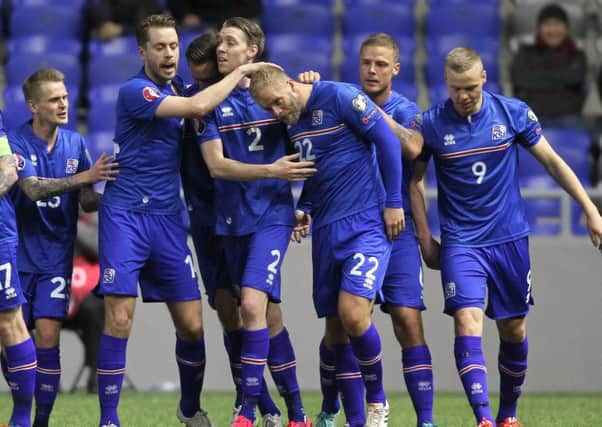Iceland’s ascent to Euro force has been no fluke


The Scotland Under-21 coach openly admitted earlier this week, ahead of a qualifier against Iceland, that he found the island’s recent success something of a mystery.
It was hardly the kind of response desired from the man charged with rearing Scottish football’s next generation. Perhaps Sbragia should have given Steven Lennon a ring.
Advertisement
Hide AdAdvertisement
Hide AdThe former Rangers and Partick Thistle striker lifted the Icelandic top-flight title with Fimleikafélag Hafnarfjardar just two weeks ago, and is now preparing for a fourth season on the volcanic island, having spent two years with Fram too. Lennon knows more than most about Iceland’s rise to the top of the international game.
“There’s been real progress, even in the four years I have been here,” he says. Indeed, Iceland – a country of just 329,000 inhabitants – are bantamweights competing in a heavyweight division. They are a footballing anomaly and provide a blueprint for small nations looking to break into the big-time.
Iceland’s achievement in reaching Euro 2016 could perhaps be written off as a fluke had their progress not been so steady and assured in recent years. They came within a play-off – suffering a 2-0 aggregate defeat by Croatia – of making it to the 2014 World Cup, only just missing the boarding call to Brazil.
Their success is something of an open secret, though – even if Sbragia doesn’t know it. Their footballing programme has made for countless case studies, with coaches running their own audits on their methods and practices. Northern Ireland manager Michael O’Neill even visited his Icelandic counterpart, Lars Lagerback (a man Icelanders now call The King, according to Lennon), ahead of his country’s Euro 2016 qualification campaign.
Their ascent is the culmination of a sporting programme the best part of a decade in the making. An infrastructural drive by the Icelandic FA 15 years ago has resulted in the construction of several indoor complexes, most of them beside schools. Such investment has surely played a significant part in the country’s success in making it to Euro 2016.
“Iceland have six Toryglens throughout the country,” explains Lennon. “At my club, we have a half-size indoor pitch – about the same size as Murray Park – and they have just built a quarter-size indoor pitch as well. In the next year or so they’re going to build a full-size indoor arena, and that’s just one club.”
But their development is down to much more than just indoor pitches. As of 2010, 41 per cent of coaches hold Uefa B licences or higher, a figure likely to have risen further in the five years since then. With the improvement in coaching has come an improvement in player production.
“Scotland probably rely too much on the older generation and the likes who are in charge at the Scottish FA,” explains Lennon. “I worked with people like Ross Mathie, Billy Stark and Archie Knox during my time in the Scotland set-up. They are all good coaches, but maybe they’re at the other end of the new generation that should be coaching these kids. The game has changed since they played, and I think Iceland have got younger coaches who are qualified at a higher level.”
Advertisement
Hide AdAdvertisement
Hide AdIceland has produced good players in the past – Eider Gudjohnsen and Gylfi Sigurdsson, to name just a couple – but never before all at the one time. “This is their golden generation,” as Lennon puts it, and they have come through the country’s youth ranks together – initially marking their card at the 2011 European Under-21 Championships.
“From that team I think eight to ten players made the progression into the senior team,” expands the 27-year-old. “That could be something Scotland could learn from, because you don’t see five or six players from the 21s team coming into the senior team. You might get one or two per year if you’re lucky. When I played with the 21s team we had [Steven] Fletcher, [Steven] Naismith, [Ross] McCormack and those are the only ones who are in the squad for Scotland now.”
Whatever the reason, Iceland is doing something Scotland isn’t. There are lessons to be learned, even if, as Lennon admits, “things have gone their way. They’ve had some luck”. With the Netherlands national team now a blazing wreck of Oranje following their failure to qualify for Euro 2016, Iceland might now provide the template for Scotland to follow as European football’s small country done good.